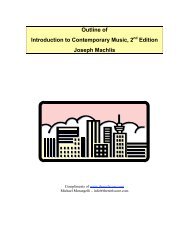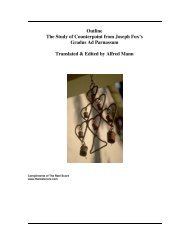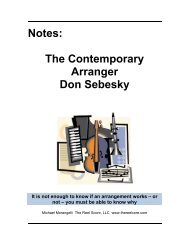An Outline of The History of Western Music Grout ... - The Reel Score
An Outline of The History of Western Music Grout ... - The Reel Score
An Outline of The History of Western Music Grout ... - The Reel Score
Create successful ePaper yourself
Turn your PDF publications into a flip-book with our unique Google optimized e-Paper software.
1: a distinctive school <strong>of</strong> pianists and composers in the early 19th century<br />
2: Jan Ladislav Dussek (1760-1812) - noted for his sonatas which include some<br />
notable examples <strong>of</strong> early Romantic harmony<br />
3: Jan Václav Tomásel (1774-1850) & his pupil Jan Hugo Vorísek (1791-1825)<br />
who moved to Vienna and had a strong influence on Schubert<br />
c) Franz Schubert (1797-1828) - wrote 14 short pieces that became for piano<br />
literature what his lieder were to the vocal repertory<br />
1: departs in subtle ways form the standard Classic patterns by using substitute<br />
dominants and introducing 3 keys in his expositions instead <strong>of</strong> two<br />
2: with his three - all in 1828 - Shubert was obviously aware <strong>of</strong> Beethoven's works<br />
d) Felix Mendelssohn (1809-1847)<br />
1: a virtuoso pianist - his preludes and fugues reveal his interest in Bach<br />
2: the performance he conducted in Leipzig <strong>of</strong> the St. Matthew Passion helped<br />
spark a revival <strong>of</strong> Bach's music<br />
3: his 3 organ preludes and fugues and 6 sonatas are among the century's most<br />
distinguished contributions to the literature <strong>of</strong> that instrument<br />
e) Robert Schumann (1810-1856)<br />
1: Career<br />
i- after studies in law, he devoted himself to becoming a concert pianist, an<br />
injury to his right hand cut this career short<br />
ii- turned to composition and editing the Neue Aeitschrift für Musik (New<br />
Journal <strong>of</strong> <strong>Music</strong>) from 1814 to 1844<br />
a- his essays and reviews became an important force in the Romantic<br />
movement<br />
iii- he was one <strong>of</strong> the first to recognize the genius <strong>of</strong> Chopin and Brahms as<br />
well as the instrumental music <strong>of</strong> Schubert<br />
2: <strong>Music</strong><br />
i- all his published compositions up to 1840 (Opp. 1-23) were for piano -<br />
except his one concerto - they include most <strong>of</strong> his important works for that<br />
instrument<br />
ii- titles to collections and individual pieces suggest that he wanted listeners to<br />
associate them with extramusical poetic fancies<br />
a- attitude was typical <strong>of</strong> the period<br />
b- significant considering his admission that wrote the music before giving a<br />
title<br />
f) Fryderyk Chopin (1810-1849)<br />
1: Wrote exclusively for the piano - among the earliest and best examples <strong>of</strong> music<br />
inspiried by a national idiom<br />
i- living in Paris from 1831, he never stopped loving his native Poland or<br />
grieving because <strong>of</strong> its political misfortunes<br />
ii- his polonaises go beyond the conventional character piece <strong>of</strong> Bach's time<br />
to assert a national identity<br />
2: <strong>The</strong> nocturnes, impromtus, and preludes are his most intimate works<br />
i- his initial concept <strong>of</strong> the nocturne owed much to the influence <strong>of</strong> John Field<br />
ii- John Field (1782-1837)





